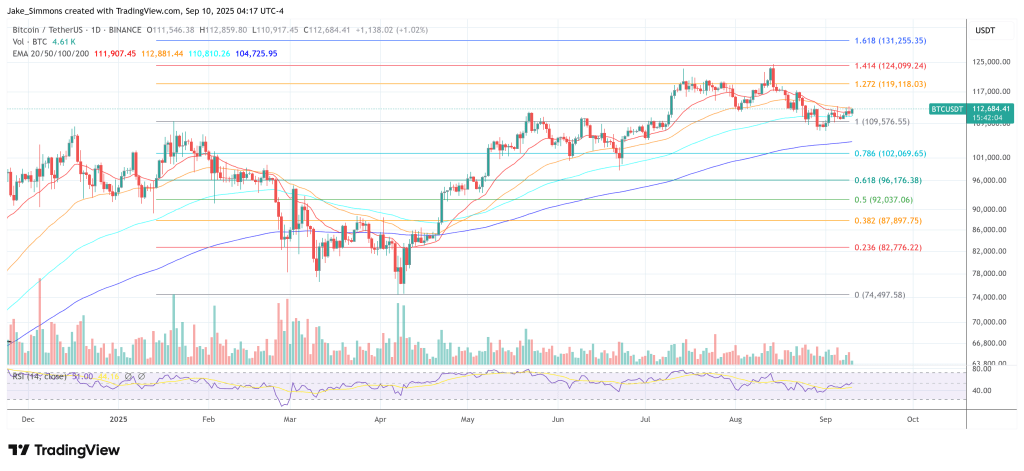
Kyrgyzstan has taken a concrete step towards making a state-held reserve of crypto belongings—centered, in observe, on Bitcoin—alongside government-backed mining operations.
Kyrgyzstan Targets Bitcoin Reserve And State Mining
At a September 9 hearing of the Zhogorku Kenesh (parliament) Committee on Funds, Financial and Fiscal Coverage, Minister of Economic system and Commerce Bakyt Sydykov stated draft amendments to the Regulation “On Digital Belongings” would introduce the ideas of “state mining” and a “state cryptocurrency reserve.”
He argued the reserve could be constructed by a number of channels—“mining, tokenization of actual belongings and the issuance of stablecoins backed by the nationwide foreign money”—and that the mechanism would “strengthen the nation’s monetary stability and supply new accumulation instruments.”
The minister anchored the dialogue in onerous numbers concerning the sector’s scale. From January by July 2025, turnover throughout firms working in Kyrgyzstan’s crypto financial system “exceeded 1 trillion soms,” producing “900 million to 1 billion soms” in tax income. Official registries now checklist 169 crypto exchangers, 13 crypto exchanges and 11 mining companies, Sydykov stated.
Vitality safety—and what asset the state would truly mine—dominated the committee alternate. MP Dastan Bekeshev warned that “about 800 thousand kilowatts are required to mine one bitcoin. That is sufficient vitality to energy about 1,200 residences for a month. Winter is coming—is it definitely worth the danger?”
In reply, Sydykov stated Kyrgyzstan applies separate energy tariffs to mining and that the state would adhere to them. He pressured no mining farms could be sited at thermal energy crops (TPPs) or on the under-construction Kambar-Ata-1 hydro facility. “The principle objective of thermal energy crops and hydroelectric energy crops, together with the Kambar-Ata-1 beneath building, just isn’t associated to mining. The capability of small hydroelectric energy crops is used for this space: 17 of them are at the moment working, and one other 15 tasks are beneath implementation,” the minister stated.
The draft overhauls market guidelines as properly. Sydykov stated that starting January 1, 2026, any crypto alternate searching for to function domestically should maintain at the least 10 billion soms in licensed capital—a prudential bar the federal government says is designed to “strengthen confidence out there and develop the crypto trade within the nation.”
Native media monitoring the invoice’s progress notice that “state mining” is outlined because the extraction of digital belongings utilizing state vitality, infrastructure and technological sources, with the reserve to be fashioned not solely from mining proceeds but additionally from token issuance and acquisitions of digital belongings owned by the state.
Whereas the invoice’s language persistently makes use of “cryptocurrency reserve,” the committee alternate and danger framing centered on Bitcoin. Bekeshev’s power-use comparability explicitly referenced “one bitcoin,” and the federal government’s most popular provide supply—mining—factors to BTC first.
Kyrgyzstan Races Kazakhstan In Central Asia’s Crypto Push
That sensible emphasis additionally aligns with prior coverage signaling. In mid-April, Kyrgyzstan’s Nationwide Funding Company signed a strategic memorandum with Binance co-founder Changpeng Zhao, formally appointing him as an advisor on nationwide blockchain coverage and Web3 technique. In early Might, throughout a go to to Bishkek, Zhao publicly recommended that the nation use Bitcoin—alongside BNB—because the preliminary belongings for a nationwide crypto reserve.
The push comes as Kyrgyzstan’s crypto sector has grow to be each a finances contributor and a geopolitical flashpoint. The surge in home platform exercise has coincided with Western sanctions scrutiny, together with British and US measures in August focusing on entities linked to a rouble-pegged stablecoin community and Kyrgyz companies alleged to have aided Russian sanctions evasion—stress that prompted President Sadyr Japarov to publicly attraction to Washington and London. The federal government has rejected wrongdoing claims and emphasised that crypto-related banking operations are beneath state oversight.
Regional context is shifting in parallel. Neighboring Kazakhstan has simply proposed making a nationwide “crypto reserve fund” beneath its State of the Nation blueprint, a part of a broader digital-assets agenda that features a pilot “CryptoCity” and new laws by 2026.
Analyst Daniel Batten highlighted a key distinction with different Bitcoin-curious states, noting on X that, “In contrast to El Salvador, Pakistan, Argentina, CAR, Kazakhstan does not have an IMF loan—so this order is prone to undergo unimpeded.” If Astana proceeds, it could mark a second Central Asian sovereign constructing a proper digital-asset buffer, intensifying regulatory and aggressive dynamics within the area.
At press time, Bitcoin traded at $112,684.

Featured picture created with DALL.E, chart from TradingView.com

Editorial Course of for bitcoinist is centered on delivering completely researched, correct, and unbiased content material. We uphold strict sourcing requirements, and every web page undergoes diligent evaluation by our crew of high expertise consultants and seasoned editors. This course of ensures the integrity, relevance, and worth of our content material for our readers.






